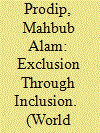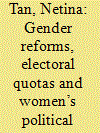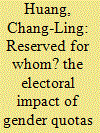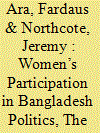|
|
|
Sort Order |
|
|
|
Items / Page
|
|
|
|
|
|
|
| Srl | Item |
| 1 |
ID:
182523


|
|
|
|
|
| Summary/Abstract |
This comparative case study uses qualitative data to explore and analyze the institutional obstacles that women in reserved seats face to their political empowerment in the Gram Panchayat in India and the Union Parishad in Bangladesh. The findings reveal that women in reserved seats in both countries confront some fundamental institutional barriers, such as a masculine model of politics, lack of political party support, as well as lack of power and resources. Indian women face serious problems—the inclusion of ex-officio members, the rotational system, bureaucratic dominance, and partisan elections—whereas Bangladeshi women suffer from the unequal distribution of reserved seats under a quota policy and lack of clarity in rules, power, and provisions. A lack of financial resources limits the effective participation of women members in the decision-making process in both countries. Further institutional reforms are vital to ensure women’s political empowerment through reserved seats in both countries.
|
|
|
|
|
|
|
|
|
|
|
|
|
|
|
|
| 2 |
ID:
145753


|
|
|
|
|
| Summary/Abstract |
In the last two decades, more than 118 countries and political parties around the world have introduced gender quotas to guarantee women’s political representation. While the study of gender quotas and electoral systems is an exciting field, few studies have focused on East Asia. Why do traditionally male-dominated parties engage in gender reforms? Have gender reforms improved women’s political representation and participation? To address these questions, this introductory article offers an overview of the electoral rules, gender quotas, and candidate selection methods adopted in three broadly similar cases with different outcomes in Taiwan, South Korea, and Singapore. Taiwan and South Korea introduced mixed electoral systems and legislated candidate quotas to improve women’s legislative representation at the local and national levels. Singapore resisted legislating gender quotas while the ruling party voluntarily introduced a party quota in 2009. These gender equality strategies have brought slow and uneven results. Based on qualitative and quantitative methods as well as survey and electoral data, this paper offers new evidence showing why the effects of electoral systems and quota strategies are not automatic or mechanical, but dependent on the degree of party system institutionalization, electoral competitiveness, legal enforcement, and social-cultural attitudes toward women.
|
|
|
|
|
|
|
|
|
|
|
|
|
|
|
|
| 3 |
ID:
175135


|
|
|
|
|
| Summary/Abstract |
Ethnic and religious minorities have played a significant role in the long history of Kurdistan. At an official level, their political position was significantly strengthened with the advent of autonomy for the Kurdistan Region in northern Iraq in 1992. Most importantly, a quota system was established that reserved seats for several minority groups in the Kurdistan Parliament, often cited as an example of tolerance for diversity and respect for minority rights. Nevertheless, there is a lack of empirical research examining how ethnic and religious quotas affect democratic stability, quality of representation, and opportunities to represent authentic interests within the Kurdistan Regional Government (KRG). The politicians who occupy the reserved seats have come under criticism for merely supporting the policy programs of the dominant Kurdish parties, which deprives ethnic and religious minority groups of authentic representation and exposes the minority parties to allegations that they are politically exploited. This article analyzes the dynamics of minority political participation in Iraqi Kurdistan, how representation has been affected by the dominance of the ruling parties, and factors that guide the behavior of minority politicians while serving in quota-allocated positions. It also examines the effects of reserving seats through the quota system on the political behavior of minority groups. To these ends, this article focuses on parliamentary quotas and their impact on democratic stability, decision-making, and the empowerment of minority groups in the Kurdistan Region.
|
|
|
|
|
|
|
|
|
|
|
|
|
|
|
|
| 4 |
ID:
145754


|
|
|
|
|
| Summary/Abstract |
Since the 1990s, gender quotas in elections have become a global phenomenon.
One of the issues raised about gender quotas concerns the qualifications of quota women. A previous study that looked at France’s parity law showed quota women are as competent as or even more competent than non-quota women or non-quota men. The French experience, under the proportional representation system, only allows for a comparison of average qualifications between quota women and their non-quota counterparts.
|
|
|
|
|
|
|
|
|
|
|
|
|
|
|
|
| 5 |
ID:
172210


|
|
|
|
|
| Summary/Abstract |
This article presents qualitative data from interviews conducted with female national parliamentarians and local government councillors in Bangladesh regarding barriers to women’s participation in electoral politics. The evidence suggests that a gender wall comprised of institutional, historical, socio-economic and cultural factors continues to prevent Bangladeshi women’s full participation in formal politics at both national and local levels. Since Bangladesh now operates a policy of affirmative action through reserved seats for female politicians, the question arises to what extent this can be seen as a useful longer-term strategy to counteract gender discrimination.
|
|
|
|
|
|
|
|
|
|
|
|
|
|
|
|
|
|
|
|
|